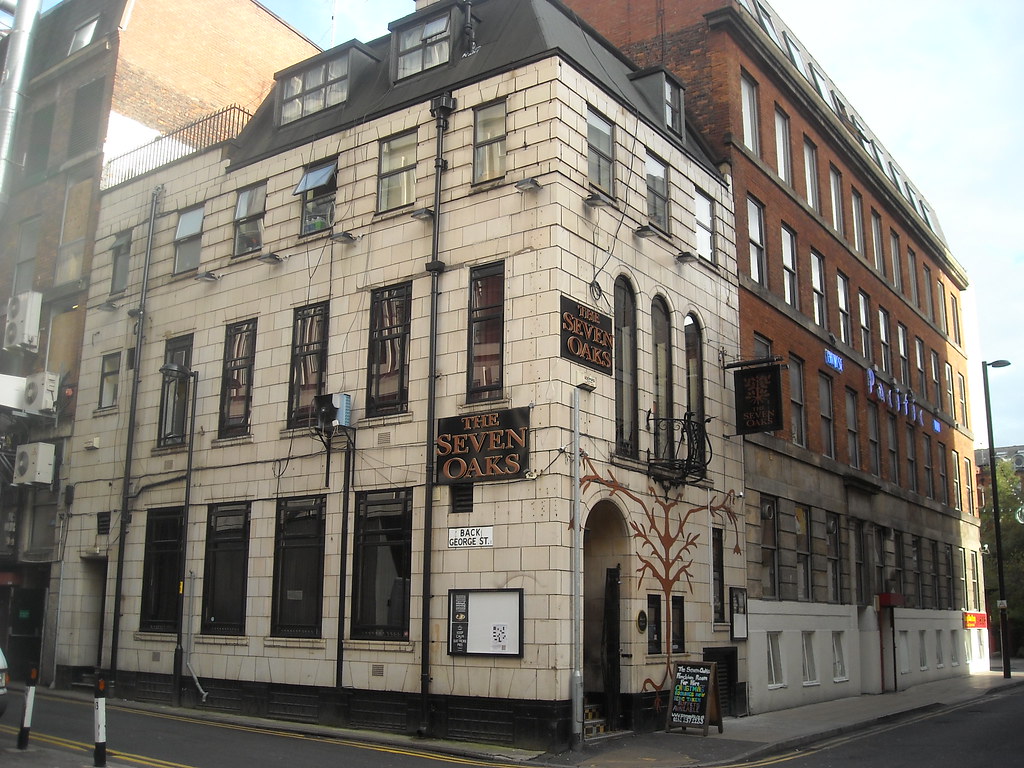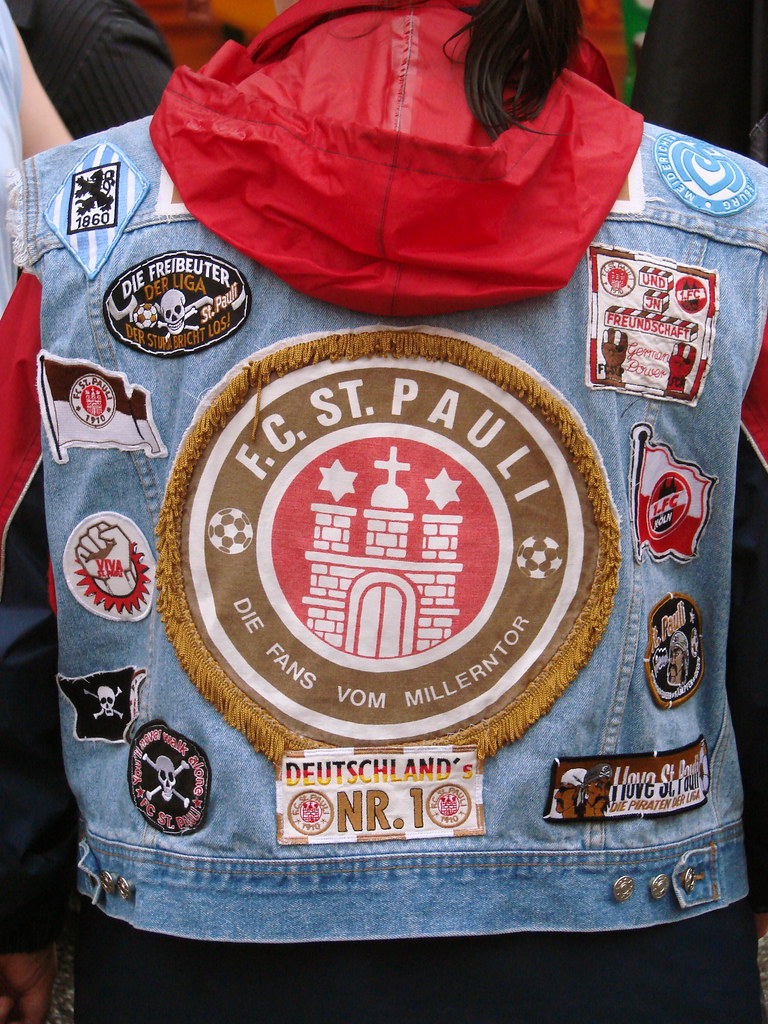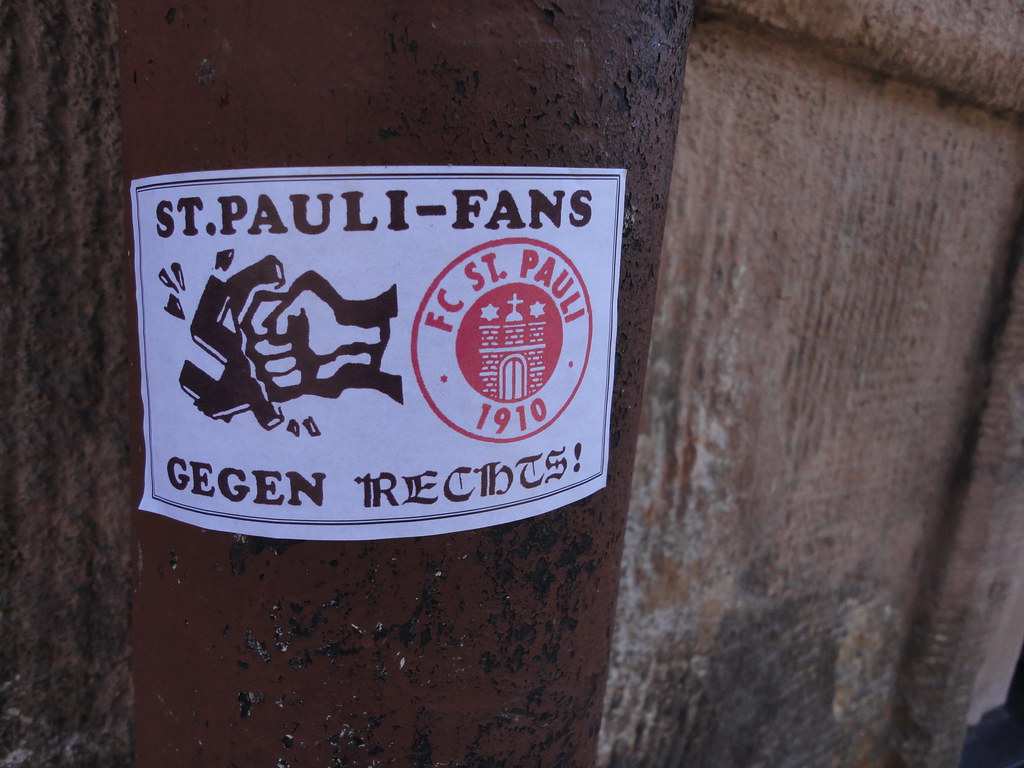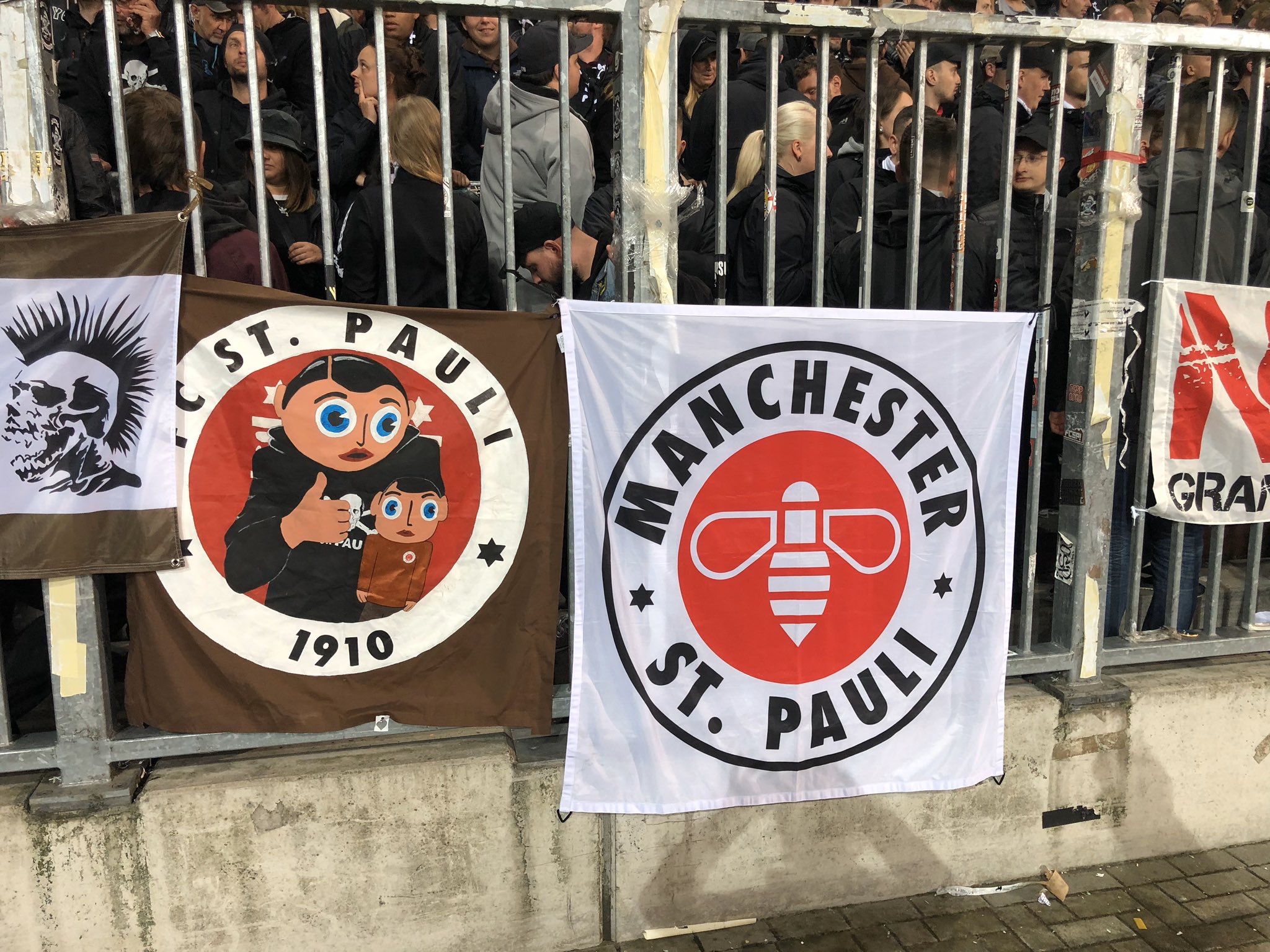The Manchester St. Pauli fan group recently celebrated three years since their first match screening. But how is their ‘safe space’ about more than just football?
NB: This article was first published on 27/08/2020 as part of a major project. All information accurate as of the published date. All interviews conducthttps://cardiffjournalism.co.uk/life360/its-grittier-it-feels-like-we-live-it/ed within the COVID-19 government rules at the time of writing.
Hidden away in the back of Manchester’s Chinatown The Seven Oaks pub hosts another Saturday afternoon of football. Between sips of Punk IPA, UX designer Barry Briggs says the venue always used to be a spot for a quiet pint when the city centre bars had all closed. But for the last three years, match-day has meant a crowded room where football, left-wing politics and punk music mix.
“When we were looking for a venue, we wanted to create a safe space more than anything, we didn’t want it full of your usual football knobheads,” Barry says. “Just because we have a diverse group of fans, whether that’s race, politics, gender, whatever. That immediately shrunk the number of places and it meant that we couldn’t go to your average footy pub on a Saturday afternoon and watch it.”
While they support clubs nearby, Barry says they have now all adopted FC St. Pauli as their primary club. A cult club from Hamburg’s Red-Light District, or the Reeperbahn (mile of sin).
It isn’t ordinary to find a group choosing a football pub on the strict condition that it contains as few of the ‘normal’ football crowd as possible. Particularly when the result is a group containing left-wing punks and anarchists entering a pub once described as having Manchester’s most ruthless landlord. But nothing about this group appears ordinary.
In 2017, after searching for local venue that could meet their criteria, The Seven Oaks became a weekend haunt for the Manchester St. Pauli group. Originally a dozen or so found refuge from another downpour before dashing to Primark to replace their sodden socks. On return, they drank beer, talked politics, football and their future. Locals looked bemused at this new group in black punk attire adorned with skull and crossbones logos that sat watching a German second division game.
They are given the bar space upstairs to not upset any customers looking for Premier League games on the big televisions. Despite praising the fact they have their own area, they worry about the lack of wheelchair access. A key part of their constitution being accessibility and ‘football for all’.
The group now have perfected their match-day ritual since that first rainy Saturday in 2017. They arrive half an hour before kick-off, grab a pint, set up flags and other paraphernalia in their private space before other members arrive. As their website says, “it’s better to have your hopes dashed in good company, after all.”
It took a while for the stragglers to join. In the past, it was a handful of members straining to understand Sky Deutschland commentary, or even St. Pauli’s official streaming service. Barry laughs at the afternoons avoiding the scores online to watch the stream uploaded after the game. He says locals would go to the pub after and forget to upload the second half. It’s unclear if he is joking or not.
Now, the group has around 60 members who tightly cram in the donated upstairs section to watch on any given Saturday. But Barry insists the group is, and has always been, about more than obscure football and copious amounts of beer. “Once we realised there were enough of us this side of the Pennines, we talked about what the group should be about,” Barry says. “Should we be sat in a pub, watching a game, drinking beer or should we be doing more? Like the club does.”

St. Pauli’s fans accept their position as perennial strugglers, with the club narrowly avoiding relegation recently. Despite their lack of trophies, they have won admirers and critics over the last 30 years for their intense activism and strict anti-racist, anti-homophobic and anti-commercialist values.
The club’s renaissance began in the late 1980s. Racism and hooliganism were prominent on other terraces and the club attracted more disparate groups that found no comfort in the state of football.
The creeping gentrification in Hamburg’s port districts saw an influx of squatters, punks, anarchists, and the politically left-leaning in the neighbourhood. Before long, they would head to the club’s Millerntor Stadium to watch the team. The club quickly became place for like-minded discussion over politics and local issues, even if the quality on the pitch has arguably not been the club’s main appeal.
Barry and the other members of Manchester St. Pauli accept their club will never bring football up to the standard of their local clubs Manchester United and Manchester City. But with all the outside scrutiny and commercialism the top clubs receive, it is unlikely they would ever want to be.
“St. Pauli are about more than football and I always say it’s just as well, because the football is bollocks,” he says. “Apart from the City and United fans, the rest of us have this running joke that we must just like shit football.”
British fans who have converted often speak of a ‘pureness’ of the club, bereft of modern football’s intense commercialism and undercurrents of racism and homophobia. St. Pauli as a club are often described as bringing back ‘soul’, a real buzzword for fans bemoaning how soulless the game has become.
In Nick Davidson’s book Pirates, Punks and Politics: Falling in Love with a Radical Football Club he explains his rationale for leaving British football behind. “Football sold itself down the river. The Premiership had distorted everything,” he says. “Salaries and admission prices had gone through the roof, kick-off times were at the mercy of the television executives and the very soul of football had been sold to the highest bidder.”
Barry grew up as a Sheffield United fan. Initially, he only followed St. Pauli as a secondary club after hearing of a club in Germany which shared his left-wing politics and had an interesting skull and crossbones emblem. Then when the club fell on hard times financially, punk rock band, Sisters of Mercy, one of Barry’s favourites, sponsored them.
“I went to Hamburg about fifteen times before it coincided with a game being on, it was always for gigs,” Barry says. “Then I went to the ground, checked out the shop, loved the whole vibe of the ground, little bit scuzzy, a bit punky, stickers and graffiti and shit everywhere. A far cry from the bloody Etihad or Old Trafford or any of that shite.”
He hesitates to use the ‘pure’ cliché to describe the experience but acknowledges a connection when he finally saw the club’s Millerntor Stadium. “I just thought I like this, it feels gritty, more traditional but without some of the baggage that comes with traditional British football.”
As he grew fonder of St. Pauli, supporting Sheffield United was becoming increasingly problematic as he heard things around him on the terraces more clearly.
Remembering an away trip to nearby Port Vale, he says “They had an Italian striker who happened to have long, scruffy hair, as strikers from the continent used to do. There were blokes all round me calling him racist names which made me feel so uncomfortable. So, to think you could go to a footy game and not only is that not part of it, but that they’re passionately opposed to that…”
In 2017, the same year Manchester St. Pauli were formed, their team were the fourth best club in Germany in terms of merchandise revenue despite their lowly status in the second tier. But, with a rebel, punk image to preserve, every move the club makes now comes with intense fan scrutiny and deep philosophical questions to reconcile.
“Every accusation that people level at the club about being merchandising whores is absolutely true. You can’t deny it.” Barry says. “I remember being amazed the first time I went to the club shop; if you could make it in black and you could print a white skull and crossbones on it… they had one. Just ridiculous.”
Yet, he admits raising the bulk of their funds by flogging a symbol of counterculture is easier to swallow. “At the same time, that seems quite a good way of raising funds, most rock bands these days raise money through merch sales rather than record sales. So, if you’ve got that at your disposal, sell the shit out of it.”
Merging high morals and a football club’s ultimate business nature presents difficulties. Jonathan Cable, an academic specialising in sport and political protest at Gloucestershire University says, “They’re not explicitly anti-commercial, they do make money off this ‘over-the-counter-culture.’ So, commercialism can cause a clash and how far can a club go?”
A big part of the Manchester St. Pauli’s group ethos is the ‘safe space’ environment which Barry frequently refers to. A place like no other, where the two worlds of politics and football fandom collide. Group decisions are decided through discussion and votes and the group frequently praise their club’s ability to listen to fans.

Barry mentions an incident just under a decade ago, where the Millerntor Stadium contained a corporate box for one of their sponsors, a local strip club. After it became apparent home goals were celebrated by pole dancers gradually exposing themselves more and more, this became a proposition too insensitive to the club’s morals and was swiftly stopped.
“Arguably they shouldn’t have made that misstep in the first place, but the fact that when the fans complained they listened… could you imagine City doing that?!”
There are many reasons why feelings of despondency are driving British football fans towards Germany and in one way or another they all seem to come back to money. Whether it is the cost of tickets, which is driving out the younger fans and bringing in what Barry and others call the “prawn sandwich brigade” at Manchester United. Or the money clubs have at their disposal meaning fans are reduced to passive consumers with very little say in how their club is run.
In Germany, there is the “50+1 rule” whereby clubs require a ruling percentage of fan ownership, which is intended to prevent outright takeovers by wealthy oligarchs. There are exceptions, but they are both rare and roundly criticised.
Because of this rule, fan engagement and activism are more prominent elements. But German football as a whole has significant differences in terms of fans’ experiences, with St. Pauli just being an alternative option within this bracket. Ellis Jones, a British fan who frequently watches FC Köln credits what Germany does, and Britain does not do, from a fan perspective:
“Safe standing being allowed in most stadiums and being able to drink beer at your seat is really convenient. It’s both expensive and sometimes inconvenient to travel to football matches in the UK. In Cologne, the tram is free with a match day ticket. Another example of German football doing things right, in my opinion.”
When the BBC’s Price of Football survey found in 2015 some season tickets for Germany’s top club Bayern Munich could be purchased for less than the cheapest equivalent ticket at every club in the top four leagues in England and Scotland, fans started realising a football holiday may not hurt their bank balance as much as they thought.
As the conversation comes onto activism in Germany and how St. Pauli may not be the only kids on the block when it comes to mixing politics with football, Barry references Union Berlin’s left-wing ethos. But believes St. Pauli’s uncompromising approach to politics makes them unrivalled in this sense.
“There’s certain stuff that Union Berlin do really, really well that St. Pauli don’t but my opinion is St. Pauli do a lot more and are a lot more in your face about it,”he says.
“I’d say that Union Berlin maybe hold back a little bit because they’re worried about the commercial impact of some things. St. Pauli wear rainbow flags on their shirts and have skull and crossbones on their corner flags, it feels like they live it a little bit more.”
Executive decisions at St. Pauli are made in accordance with their values. Even on occasions where it may hinder their success on the pitch.
The club’s last stint in the Bundesliga led to more flirtation with commercialism as more external partners wanted to come on board. For most clubs this would be a lifeline, for St. Pauli fans this meant fears of losing their soul and they responded with a series of protests.
Another issue is how much of the club’s politics and activism is taken in by British fans sampling St. Pauli. The club’s politicisation was never intended as a footballing gimmick and it was more of a happy coincidence that the club became the place where football, politics and local issues mingled. While German journalist and pundit Raphael Honigstein believes St. Pauli fans follow the club “hook, line and sinker” and do not separate the club from its values, he says of British fans: “I don’t know if they internalise St. Pauli’s values or if they just see it as a bit of an adventure in an alternative football lifestyle. It’s probably a bit of both, but I think for people there on the ground it obviously means something different than for someone who just kind of opts in for a weekend.”

Because of the context that saw the club entice outsiders in the first place, it may be understandable that resentment could grow locally of St. Pauli becoming a haunt for the footballing hipster. Their famous Totenkopf logo may be visible in every quarter on matchday but has also been likened to someone wearing a Ramones t-shirt without knowing a single song. Even Barry, who sits wearing a hat with the same logo admits you could buy one in passing at Hamburg airport.
But perhaps a lack of viable alternatives in Britain makes the pilgrimage to Germany worth the effort. In non-league football, the lack of large investment makes fan-engagement more hands-on and supporters can have a genuine say in the running of their club. Invariably, the more successful a club is in the UK, the more supporters are reduced to customers and their influence wanes as cash flows in.
Raphael Honigstein says context is the key to St. Pauli’s global appeal as something different. “I think there was that specific moment in time when people in Hamburg disliked hooliganism right-wing attitudes they were at Hamburger SV and thought “you know what, I’m going to support the other club,” he says. “But this other club was already there. Maybe they just kind of co-opted it. And it’s difficult to imagine in 2020 it happening again.”
As Barry and the group celebrate three years as a Saturday haunt for its members, their current aim is trying to work out when it is safe and responsible to return to Chinatown for a screening. They are continuing their charity work and have started a five-aside football tournament.
Lockdown has temporarily halted the group’s progress and while they have managed to raise money for Homeless Aid UK during the pandemic, the group are keen to return to their safe space. “We feel more connected to the club than others I suppose,” Barry says. “The lefty, punk, ‘Nazis fuck off’ stance is a bit grittier and a bit more real. But we try and keep an informal, family atmosphere if we can.
